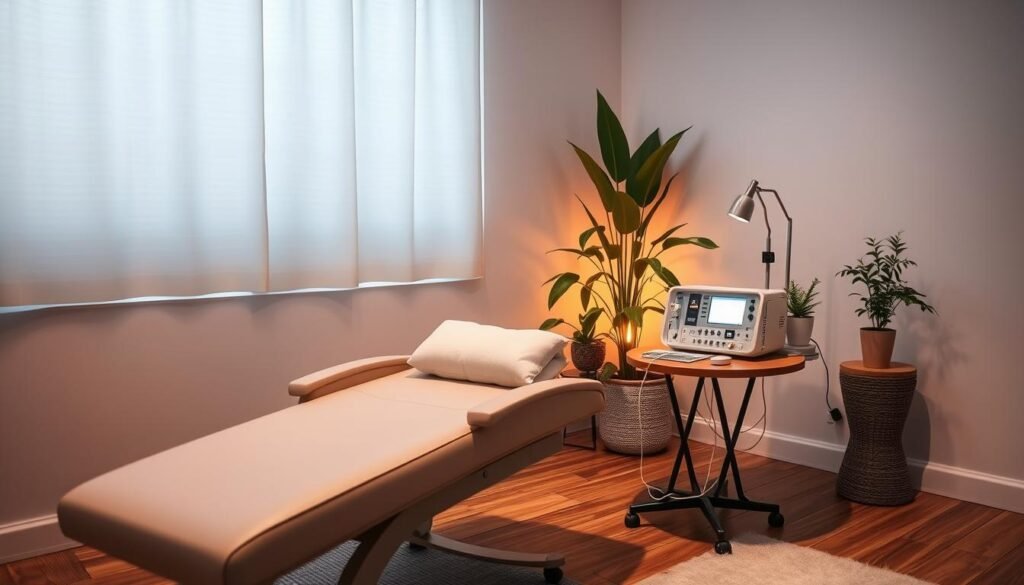Did you know about 40 million adults in the U.S. struggle with anxiety each year? That’s 18.1% of the population. Yet, only a few try groundbreaking treatments like ketamine therapy. For them, ketamine has been a game-changer in fighting anxiety.
Almost half of the people with generalized anxiety disorder don’t find relief with usual treatments. Yet, ketamine therapy brings them hope. Many share stories of their anxiety levels dropping significantly. For example, some go from feeling anxiety at a level of 8/10 to just 2-3/10 after ketamine infusions.
This article looks at how ketamine therapy changes lives. It delves into the science behind its success. Through personal stories, it offers an in-depth view of this cutting-edge treatment. The goal is to understand how ketamine can significantly improve mental health.
Key Takeaways
- Anxiety disorders affect 40 million adults annually in the U.S.
- Only around 43.2% of individuals with generalized anxiety disorder receive treatment.
- Ketamine has shown success in rapidly reducing anxiety symptoms in many patients.
- IV infusions and nasal sprays are common methods for administering ketamine.
- Ketamine treatments can be life-changing for those with treatment-resistant anxiety.
An Overview of Anxiety Disorders
Anxiety disorders are a type of mental health condition that really affect many people’s daily lives. In the United States, about 18.1% of adults suffer from anxiety each year. This shows how important it is to deal with these issues.
Generalized anxiety disorder (GAD) is a common anxiety disorder. It causes a lot of worry about different parts of life. People with GAD may feel restless and can’t control their anxiety. There are also social anxiety, panic disorder, and obsessive-compulsive disorder (OCD). Each one has its own symptoms and ways to cope.
Anxiety and depression often go hand in hand, making treatment harder. Anxiety does more than just cause worry. It can hurt friendships, work, and how happy you feel. The reasons for anxiety include stress, genes, and where you live.
Dealing with anxiety disorders is a big task. We need to raise awareness and find the best ways to treat them. A focus on the community and new treatment methods are key for better mental health.
| Anxiety Disorder Type | Characteristics | Common Treatment Options |
|---|---|---|
| Generalized Anxiety Disorder | Excessive worry, restlessness, fatigue | CBT, medication, lifestyle changes |
| Social Anxiety Disorder | Intense fear of social situations, avoidance behavior | Exposure therapy, medication |
| Panic Disorder | Recurrent panic attacks, physical symptoms | Medications, relaxation techniques |
| Obsessive-Compulsive Disorder | Intrusive thoughts, compulsive behaviors | Cognitive-behavioral therapy, medications |
What is Ketamine?
Ketamine was first made as an anesthetic in the 1960s. Now, it’s seen as a big change for mental health care, especially for anxiety. Unlike regular antidepressants that take weeks to work, ketamine can work fast. While 30 to 40 percent of people don’t get better with usual drugs, many feel better almost right away with ketamine.
What makes ketamine special is how it works on the brain. It helps manage stress and how we form memories of tough times. This is why it’s really good at lessening anxiety symptoms. Studies show that it works better than fake treatments, especially for social anxiety.
The benefits of ketamine go beyond just quick relief. It gives new hope to those who haven’t got better with other treatments. Research says over 70 percent of patients improve after just three sessions. Ketamine treatments can be customized, offering a more personal approach than standard care.

More and more people are trying ketamine as its reputation grows. With 18 percent of adults in the U.S. dealing with anxiety and a high risk of serious issues like suicide, ketamine shows promise. Some studies found that it can help in just an hour after one dose, lasting up to two weeks. This makes it a strong option in the changing world of mental health care.
How Ketamine Works for Anxiety Relief
Ketamine helps with anxiety by affecting the brain’s wiring. Studies show it targets important brain pathways for mood control. When ketamine helps the brain make new connections quickly, it helps those with anxiety feel better fast.
The Mechanism of Action in the Brain
Ketamine mainly works on the brain’s glutamate system, key for sending signals. It helps create new connections in the brain. This can change how we feel and lower anxiety. People often feel better quickly after starting treatment.
Connections to Glutamate System
Trials on ketamine show it boosts glutamate, aiding brain flexibility. This is crucial for those who don’t respond to usual meds. Ketamine provides a new hope with its fast-acting benefits.
Personal Stories of Ketamine Therapy
Personal stories highlight how ketamine therapy changes lives. They show deep changes in those battling anxiety and depression. These tales prove how powerful ketamine can be, offering hope to those who feel lost.
Kelly Burch’s Journey with Ketamine Infusions
Kelly Burch wrestled with deep anxiety after her husband died. She felt stuck in endless grief. Seeking help, she turned to ketamine treatments.
Just 40 minutes into her first session, she felt a change. As treatments went on, her life began to brighten. She found joy and hope again.
James’ Transformation with Ketamine Treatment
James was swamped by anxiety for too long. Traditional treatments didn’t help him. Then, he tried ketamine therapy.
After six sessions, he felt a huge improvement. James went from seeing life in gray to full color. He started enjoying his hobbies and friends once more.

| Name | Background | Experience with Ketamine Therapy | Impact of Therapy |
|---|---|---|---|
| Kelly Burch | Widowed, struggling with grief | Initial shift in 40 minutes; improved emotional state | Renewed engagement in daily activities |
| James | Long-term anxiety sufferer | Notable relief after six infusions; regained control | Enhanced quality of life, reconnected with hobbies |
Ketamine Cured My Anxiety: Testimonials from Patients
Ketamine therapy has changed many lives, offering a real cure for anxiety. These stories highlight its value in bringing about major mental health improvements. People find a new sense of happiness and stability.
Real-life Experiences of Relief
Suzy Hanson is among those who saw great benefits from ketamine treatments, spending about $3,000. These sessions, costing $500 each, show the investment needed for change. Josh also turned to ketamine after struggling with anxiety and depression for many years.
Despite facing tough times, including panic attacks and a divorce, he discovered comfort in his treatments. He felt supported and calm. His loved ones noticed his improvement quickly, proof of ketamine’s ability to ease anxiety.
The Effects of Ketamine on Mental Health
Since the 70s, ketamine was known for its use in anesthesia. It gained wider attention in 2019 when approved as a nasal spray for depression. Although it’s an off-label use for anxiety, its benefits have been significant.
Josh’s story shows how ketamine gave him new ways to handle life’s stresses. He found hope and resilience that impressed everyone around him. This highlights ketamine’s powerful impact on mental health.
Those dealing with anxiety and depression are encouraged by Josh and others. Ketamine offers a journey to healing, opening up new opportunities. It’s a beacon of hope for those suffering from anxiety.

The Clinical Research Behind Ketamine Therapy
The world of mental health care is rapidly changing, with ketamine therapy emerging as a key player. Studies are highlighting ketamine’s potential to quickly ease depression and anxiety symptoms. Unlike traditional medicines that take weeks to work, ketamine can show effects within hours.
Key Findings from Clinical Trials
Recent studies show ketamine’s impressive effect, especially for those who haven’t found help elsewhere. One important study found that a low dose of ketamine given through an IV could reduce depressive symptoms in just one hour. This was based on an evaluation of 25 patients, revealing ketamine’s quick action against depression and anxiety.
The Future of Ketamine in Treating Anxiety Disorders
Ketamine therapy is becoming more popular for treating anxiety. It is being seen as a crucial part of overall treatment plans, used along with behavioral therapies and support. As research continues, ketamine could be used more widely for various mental health issues.
These discoveries are changing how we view treatment for mental health. They bring new hope to people who have been suffering for a long time. More research will show us how ketamine can improve lives.
| Duration of Effect | Response Time | Patient Population |
|---|---|---|
| Up to 2 weeks | 1 hour post-infusion | Patients with treatment-resistant depression |
| Potentially longer with boosters | 2 weeks and 1 month post-treatment | Patients experiencing anxiety disorders |
Comparing Ketamine to Traditional Anxiety Treatments
Anxiety affects many adults, requiring effective treatments. Ketamine’s comparison with traditional anxiety treatments highlights its potential. It could offer new hope for those who find conventional methods lacking. Traditional medications like SSRIs often fall short, affecting a patient’s journey towards mental wellness.
Benefits of Ketamine Over Conventional Medications
Ketamine therapy has a clear edge: it works fast. Patients report less anxiety within hours after starting. In contrast, other treatments could take weeks to work. Studies found 33.33% of participants noticed improvements from ketamine, unlike those who received a placebo.
- Personalized Treatment Protocols: Ketamine allows for customized treatment plans for each patient.
- Fewer Side Effects: Compared to traditional medications, ketamine users face fewer side effects, reducing the risk of dependency.
- Long-lasting Effects: A single ketamine infusion’s benefits can stretch up to 14 weeks.
Ketamine could be an option when traditional treatments fail. Studies show 30% to 40% of anxiety patients don’t respond to typical medications.
Limitations of Traditional Approaches
Traditional anxiety treatments have their downsides. Many with Social Anxiety Disorder (SAD) find little relief from SSRIs or therapy. About one-third to half of these patients see no improvement, highlighting the need for better solutions like ketamine.
| Aspect | Ketamine Therapy | Traditional Treatments |
|---|---|---|
| Onset of Action | Hours | Weeks |
| Effect Duration | Up to 14 weeks | Varies; often shorter |
| Response Rate | 33.33% in initial trials | 30-40% treatment-resistant |
| Side Effects | Typically fewer | Risk of dependency |
Ketamine shines in treating anxiety fast and effectively, offering hope in the ketamine vs traditional treatment debate. It could be the breakthrough for those failing to manage their anxiety with standard options. For personal stories on ketamine’s impact, visit here.
Types of Ketamine Treatments Available
It’s important to know the different ketamine treatments for anxiety and depression relief. There are two main ways to get ketamine: through IV infusions and nasal sprays. Each has its benefits. We’ll look at these methods and how often and long you should get treatments.
Intravenous Infusions vs. Nasal Sprays
Doctors often use intravenous (IV) infusions to give ketamine therapy. This method gets ketamine quickly into your blood, helping you feel better fast. On the other hand, nasal sprays like Spravato are less invasive and specifically approved for hard-to-treat depression.
| Feature | IV Infusions | Nasal Sprays |
|---|---|---|
| Absorption Speed | Fast | Moderate |
| Administration Method | Intravenous | Nasal |
| Cost | $200 – $250 per treatment | $200 – $250 per treatment |
| Frequency | Twice a week for induction | Weekly for initial treatment |
| FDA Approval | Off-label for mental health | Approved for depression |
Frequency and Duration of Treatments
Both ketamine treatments start with an induction phase. This usually means many sessions over a few weeks. For starters, you might have six sessions in two weeks. After that, you get maintenance treatments as needed. The schedule is tailored to how well you respond to make sure the therapy works best for you.
- Initial Phase: 6 sessions over 2 weeks
- Maintenance Phase: Varies based on response
- Frequency: Adjusted to maintain symptom relief
Conclusion
Ketamine therapy shows a lot of promise for those dealing with anxiety. Some say it has “cured” their anxiety. This is due to its quick and lasting relief. Studies show it can ease anxiety symptoms in hours, lasting up to two weeks. This fast effect makes it stand out from other treatments. It’s becoming key in the future of mental health care.
Stories from patients highlight the benefits of ketamine for mental health. They show the hardships people face and the hope ketamine brings. Around 70 percent find themselves free from anxiety after ketamine infusions. This makes it a strong choice for those looking for relief. As research continues, spreading the word and making ketamine more available is essential.
Ketamine opens new doors in mental health treatment but needs careful study. The safety and long-term effects are important to understand. The ongoing discussions and clinical trial insights are crucial. They will help shape mental health care in the future. For more about ketamine and anxiety, check out this resource.